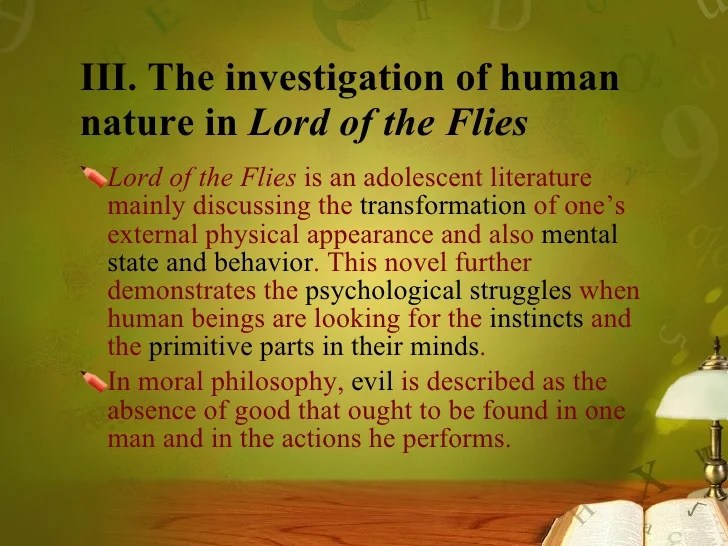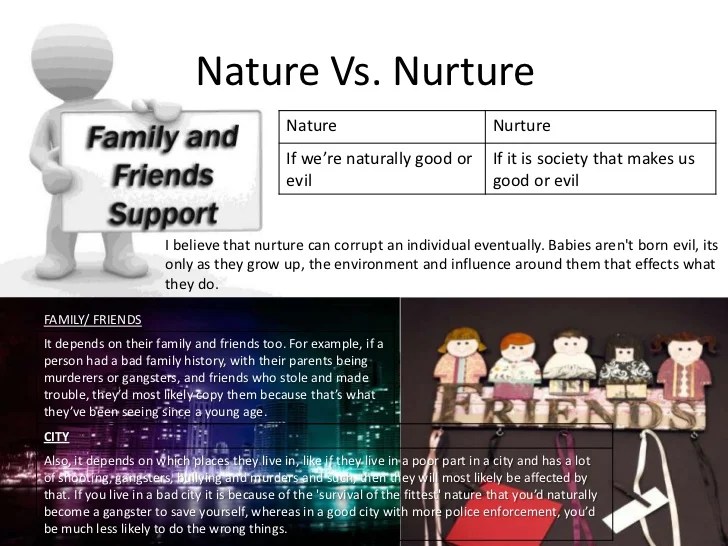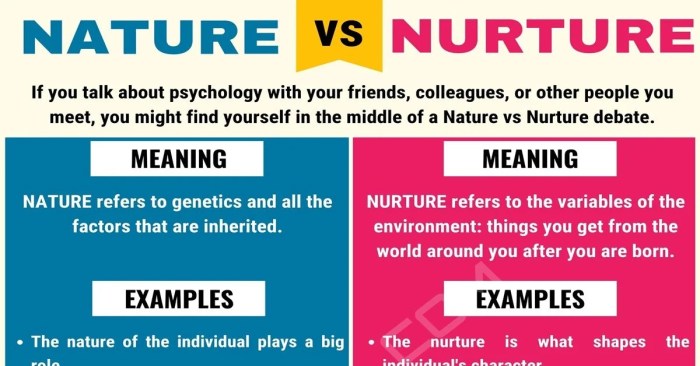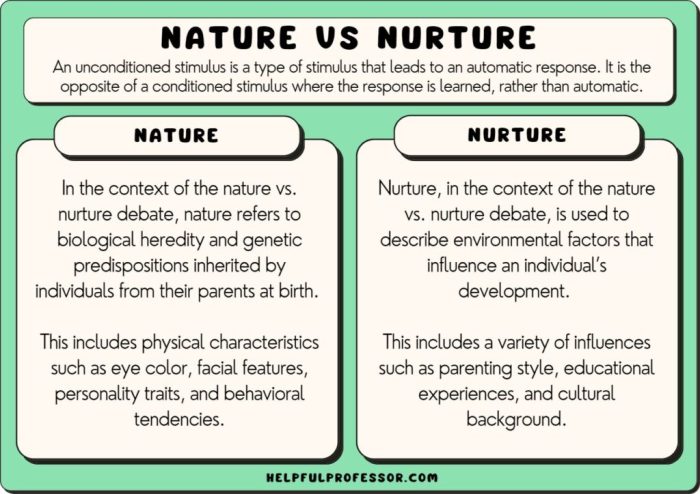Nature vs nurture lord of the flies – In the literary realm, the classic novel “Lord of the Flies” by William Golding has sparked a timeless debate on the intricate relationship between nature and nurture. This compelling narrative delves into the profound question: Are human beings inherently good or evil, or is it the environment that shapes their destinies? As we embark on this literary exploration, we will delve into the profound themes of societal norms, the fragility of civilization, and the haunting loss of innocence, all while examining the profound impact of both nature and nurture on the human psyche.
Throughout the novel, a group of young boys find themselves stranded on a remote island, devoid of adult supervision. Stripped of the constraints of civilization, they are left to their own devices, revealing the delicate balance between their inherent nature and the transformative power of their environment.
Innate Characteristics

The boys stranded on the island in William Golding’s Lord of the Fliespossess inherent qualities that shape their behavior and interactions. These innate characteristics include:
Savagery
- The boys exhibit a primal instinct for violence and aggression, evident in their hunting and fighting.
- They are quick to resort to physical force, as seen in their conflicts with Piggy and Simon.
- Their savagery is fueled by fear, insecurity, and a desire for power.
Conformity
- The boys have a strong need to belong and be accepted by the group.
- They willingly conform to the norms and expectations established by the leaders, such as Jack.
- This conformity leads to a suppression of individuality and a loss of moral judgment.
Instincts, Nature vs nurture lord of the flies
- The boys possess basic survival instincts that guide their actions, such as the need for food, shelter, and safety.
- These instincts often override their rational thinking and lead them to make impulsive decisions.
- The boys’ instincts also contribute to their fear and suspicion of the unknown, as seen in their reaction to the beast.
Environmental Influences

The island in Lord of the Fliesserves as a unique and isolated setting that profoundly impacts the boys’ development. The physical environment, characterized by its lush vegetation, abundant fruit, and lack of adult supervision, creates a sense of freedom and adventure. However, the island’s isolation and the absence of adult guidance also contribute to the boys’ descent into savagery.
Isolation and Lack of Adult Supervision
The boys’ isolation on the island removes them from the constraints and expectations of society. Without adult supervision, they are left to their own devices and must create their own rules and social order. This freedom initially leads to a sense of excitement and independence.
However, as the boys struggle to survive and maintain order, their behavior becomes increasingly primitive and violent.
Fear, Hunger, and Violence
The island’s environment also plays a significant role in shaping the boys’ interactions. The constant threat of danger, the scarcity of food, and the absence of a stable social structure create a sense of fear and uncertainty. These factors contribute to the boys’ paranoia, aggression, and eventual descent into violence.
- Fear:The boys’ fear of the unknown, particularly the “beast” they believe inhabits the island, drives them to form alliances and seek protection. However, this fear also leads to suspicion and distrust, ultimately dividing the group.
- Hunger:The scarcity of food on the island forces the boys to prioritize their own survival. This leads to hoarding, theft, and even cannibalism. Hunger becomes a powerful motivator for violence and conflict.
- Violence:The lack of adult supervision and the island’s isolation create an environment where violence becomes a means of resolving disputes and establishing dominance. The boys’ initial games and hunts gradually escalate into brutal battles and acts of cruelty.
Societal Norms

The boys in Lord of the Fliescome from a civilized society with established norms and values. These include respect for authority, adherence to rules, and a sense of morality. However, when they are stranded on the island, these norms are challenged by the harsh realities of their new environment.
Authority and Leadership
In their initial attempts to establish order, the boys elect Ralph as their leader. Ralph represents the traditional values of society, such as fairness, cooperation, and the rule of law. However, as the group faces increasing challenges, Ralph’s authority is undermined by Jack, who appeals to the boys’ baser instincts and offers them the freedom to do as they please.
Morality
The island also tests the boys’ moral values. As they struggle to survive, they are forced to make difficult choices that often conflict with their societal norms. For example, they must decide whether to hunt and eat the island’s animals, which they had previously been taught to respect.
The Role of Civilization
The boys in Lord of the Flies attempt to establish a civilized society on the island in several ways. They build shelters, create a system of rules, and elect a leader. However, they face many challenges in maintaining order and cooperation.
The desire for civilization is constantly at odds with the forces of savagery, and the boys’ attempts to create a functioning society ultimately fail.
Challenges in Maintaining Order and Cooperation
- Lack of adult supervision:The boys are without any adult supervision, and they quickly realize that they are free to do whatever they want. This leads to a breakdown in order and cooperation.
- Different personalities and values:The boys come from different backgrounds and have different personalities and values. This makes it difficult for them to agree on rules and to work together.
- Fear and mistrust:The boys are afraid of the unknown and of each other. This fear and mistrust makes it difficult for them to trust each other and to cooperate.
- The influence of the savage:The savage represents the forces of nature and chaos. He tempts the boys with the promise of freedom and power, and he encourages them to give in to their savage instincts.
The Impact of Fear: Nature Vs Nurture Lord Of The Flies

Fear plays a pivotal role in shaping the behavior of the boys on the island. It drives them towards violence and irrationality, leaving a profound impact on their mental and emotional well-being.
Fear as a Catalyst for Violence
Fear breeds aggression as a defense mechanism. The boys’ fear of the unknown, the perceived threat of the island’s dangers, and the internal conflicts within the group lead to violent outbursts. Jack’s primal instincts take over, leading to the killing of Piggy and the eventual collapse of any semblance of order.
Fear and Irrationality
Fear impairs rational thinking, making the boys susceptible to impulsive and irrational actions. They abandon logic and reason, resorting to superstition and primitive rituals. Their fear of the “beast” fuels their imagination, leading to paranoia and a loss of self-control.
Psychological and Emotional Impact
Constant fear has devastating effects on the boys’ mental and emotional health. They experience nightmares, hallucinations, and a decline in cognitive abilities. Fear disrupts their sleep, causing exhaustion and a heightened sense of vulnerability. The psychological strain leads to emotional instability, making them prone to outbursts of anger and despair.
The Loss of Innocence
In Lord of the Flies, the boys’ idyllic island existence quickly descends into savagery and violence. As they struggle to survive and establish a society, they gradually lose their innocence, becoming corrupted by the darkness that lurks within them.
Violence and Brutality
The boys’ descent into violence begins with the killing of Simon, the only truly innocent and compassionate character on the island. His death marks a turning point, as the boys realize that they are capable of great cruelty. The violence escalates with the formation of two rival tribes, the Hunters and the Litteluns, who engage in a brutal battle for control of the island.
Erosion of Morality
As the boys become more savage, their moral compass begins to erode. They abandon the rules and values they once held dear, and they embrace a primitive code of survival. They lie, steal, and betray each other, and they no longer feel remorse for their actions.
Psychological and Emotional Consequences
The loss of innocence has profound psychological and emotional consequences for the boys. They become traumatized by the violence they have witnessed and participated in. They suffer from nightmares, flashbacks, and a sense of guilt and shame. The loss of their innocence also leaves them feeling isolated and alone, as they realize that they can no longer trust anyone.
FAQ Compilation
What is the central theme of “Lord of the Flies”?
The central theme of “Lord of the Flies” is the conflict between the inherent goodness and evil within human nature, and the influence of society and environment on shaping human behavior.
How does the novel explore the nature vs nurture debate?
The novel explores the nature vs nurture debate through the experiences of a group of young boys stranded on a remote island. By observing their behavior in the absence of adult supervision, the reader can gain insights into the relative influence of innate characteristics and environmental factors on human development.
What is the significance of the island setting in the novel?
The island setting is significant because it isolates the boys from the norms and constraints of civilized society. This allows the author to explore human behavior in a more primal and unfiltered state, revealing the underlying instincts and impulses that drive human actions.